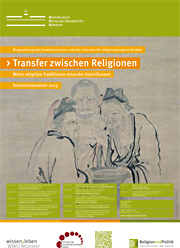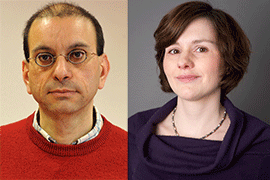“Religions are not rigid, monolithic entities”
Cluster of Excellence investigates how religions have been influencing one another from antiquity up to the present day and the dynamics triggered thus – lecture series “Transfer between religions” starting 14 April in Münster, Germany
Press release of the Cluster of Excellence, 2 April 2015

From antiquity up to the present day, religions have been repeatedly influencing one another and adopting religious and cultural traditions from each other. “Such processes of transfer and reception between religions can be seen in almost all cultural areas and epochs, triggering further dynamics”, according to Judaist Prof. Dr. Regina Grundmann and orthodox theologian Prof. Dr. Assaad Elias Kattan from the University of Münster’s Cluster of Excellence “Religion and Politics” in Germany. “Numerous examples demonstrate that religions such as Judaism, Christianity, Islam, Hinduism and Buddhism are by no means rigid, monolithic and closed entities.” The scholars announced the public lecture series “Transfer between religions” of the Cluster of Excellence and Centre for Religious Studies (Centrum für religionsbezogene Studien, CRS), starting on 14 April.
The topics of the public series range from multi-religious identities in modern pluralistic societies and transfer in China’s controlled religious plurality to the Christian-Muslim dialogue in the Middle East. The cultural exchange between Jews, Christians and Muslims via illuminated manuscripts in the Middle Ages, the transfer of relics between Eastern and Western Christianity, and the common heritage of philosophy and science in Judaism, Christianity and Islam will also be part of the programme. The Christian kabbalah, the interplay of Buddhism and other Indian religions, as well as the reception of Hindu concepts in the West and vice versa will be investigated as well. Representatives from religious studies, Byzantine studies, Indology, Islamic studies, Judaism, sinology, theology and philosophy will contribute. Phenomena of transfer have been investigated at the Cluster of Excellence in the “Integration” field of research since 2012.

Prof. Dr. Assaad Elias Kattan und Prof. Dr. Regina Grundmann (left to right)
“Up to the present day, many religious representatives have tended to negate transfer or to play it down as they see their religion’s claim to truth at risk. But it was never invisible for those with a sharp vision”, says Prof. Kattan. “The numerous case studies on transfer show how creative and dynamic religions can be.” According to Prof. Kattan, many contemporary Muslim scholars do not deny that Islam adopted elements from Judaism and Christianity: “They are introduced into the ‘larger truth’ of Islam where they are ‘corrected’ and ,purified’, according to the views of the scholars.” In the present-day lay piety in the Near East, Prof. Kattan also observes an “active transfer – for example, when Muslims in Egypt celebrate feasts of Christian character like the spring festival Shamm al Nasim”.
History offers many examples showing the transfer of religious and cultural traditions, the scholars explain. In late antiquity, for instance, many Christian thinkers were aware that Christianity was drawing on pagan elements. And when Sufism came into existence in the 8th/9th century, edifying narratives developed which are traceable to rabbinic sources, according to Prof. Grundmann. In the early days of Islamic theology in the 9th century, scholars of the Levant borrowed concepts and terms from Christian scholars, which in turn had been influenced by Greek and Jewish ideas, according to Prof. Kattan.
In addition, tales from the Hebrew Bible found, in various forms, their way into the Koran, including the tale of the binding of Isaac. At the same time, Ibrahim (Abraham in the Bible) is regarded as the erector of Kaaba, the originator of the hajj and as a prophet in Islam, as the Judaist explains. Jewish mystics, in turn, adopted concepts and practices from Sufism in the Middle Ages and rooted them in their own tradition by searching for a Jewish origin for them. Abraham Maimonides (1186-1237), for example, son of the great scholar Moses Maimonides, attributed the asceticism of the Sufis to King David.
To some extent, the adoption of other traditions influenced the view of the adopters of their own religion, as Prof. Grundmann explains using the Christian kabbalah as an example: “At the end of the 15th century, Christian scholars developed an interest in the kabbalah, from which an esoteric movement arose within Christianity that lasted several centuries. Christian kabbalists tried to explain Christian teachings such as the Trinity with the help of kabbalist concepts on the one hand, and on the other hand, they wanted to demonstrate that the true meaning of the Jewish kabbalah, according to their view, was leading to Christianity.”
The scholars emphasise that despite mechanisms of segregation, religions have never been impervious to external influences. “When religious representatives see the exchange critically, then there is an exclusive understanding of identity involved, which defines itself by dissociating itself from other identities”, according to Prof. Kattan. Dealing with transfer, however, can also be understood inclusively, thus facilitating exchange. The researchers regard it as difficult to develop a typology of transfer, “as it could comprise very different appearances – from artistic forms of expression and cultic practices to philosophical and theological ideas and patterns of thought. Depending on time and place, different elements were drawn on in each case.”
The lectures of the public lecture series will be held on Tuesdays from 6.15 to 7.45 pm in lecture theatre F2 of the Fürstenberghaus at Domplatz 20-22 in Münster. It has been organised by the Cluster’s project group “Transfer between world religions: adoption – transformation – dissociation” from the “Integration” field of research, the coordinator of which is Prof. Grundmann, and by the Centre for Religious Studies (Centrum für religionsbezogene Studien, CRS). (vvm/ska)
Programme
| 14.04.2015 | Perry Schmidt-Leukel, Münster | Warum mit nur einer Religion leben? Anmerkungen zum Phänomen multi-religiöser Identität |
| 21.04.2015 | Joachim Gentz, Edinburgh | Das Große Dao ist ohne Form, ohne Wesen und ohne Namen. Formen des Transfers zwischen Religionen im regulierten Pluralismus Chinas |
| 28.04.2015 | Angelika Neuwirth, Berlin | Traditionsbildung durch Textstrategie: der Weg der koranischen Gemeinde von Jerusalem nach Mekka |
| 05.05.2015 | Katrin Kogman-Appel, Beer Sheva | Buchkultur und Bildkultur in der mittelalterlichen jüdischen Gesellschaft: Kulturaustausch zwischen Christen, Juden und Muslimen |
| 12.05.2015 | Andreas Speer, Köln | Philosophie und Wissenschaft als gemeinsames Erbe der abrahamitischen Religionen im Mittelalter |
| 19.05.2015 | Annette Wilke, Münster | Rezeption hinduistischer Konzepte im Westen und westlicher Konzepte im Hinduismus |
| 02.06.2015 | Wilhelm Schmidt-Biggemann, Berlin | Politische Theologie der christlichen Kabbala. Der Fall Guillaume Postel (1510–1581) |
| 09.06.2015 | Michael Zimmermann, Hamburg | Vom Nicht-Selbst zur Buddha-Natur? Buddhistische Vorstellungen vom Wesen des Menschen in Wechselwirkung mit anderen indischen Religionen |
| 16.06.2015 | Görge Hasselhoff, Dortmund | Ein neues Bild vom Judentum? Maimonides im Paris des 13. Jahrhunderts |
| 23.06.2015 | Jens Halfwassen, Heidelberg | Warum ist die negative Theologie für monotheistische Religionen attraktiv? Überlegungen zur Platonismusrezeption in den abrahamitischen Religionen |
| 30.06.2015 | Michael Grünbart, Münster | Reliquientransfer – Verbindendes zwischen den christlichen Welten des Mittelalters? |
| 07.07.2015 | George Sabra, Beirut | Christian-Muslim Dialogue in the Middle East: Tradition and the Exigencies of Context |
Summer semester 2015
Tuesdays,6.15 bis 7.45 p.m.
Lecture hall F1 at the Fürstenberghaus
Domplatz 20-22
48143 Münster

